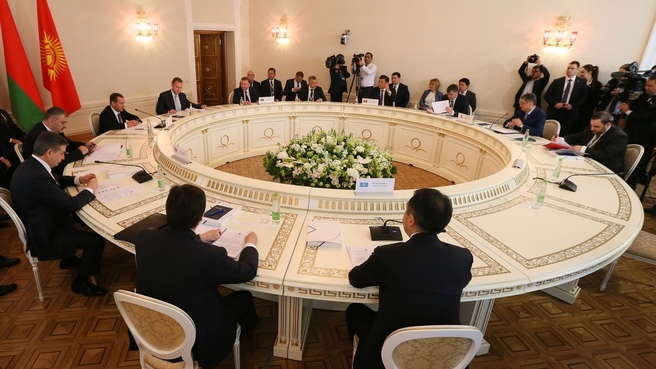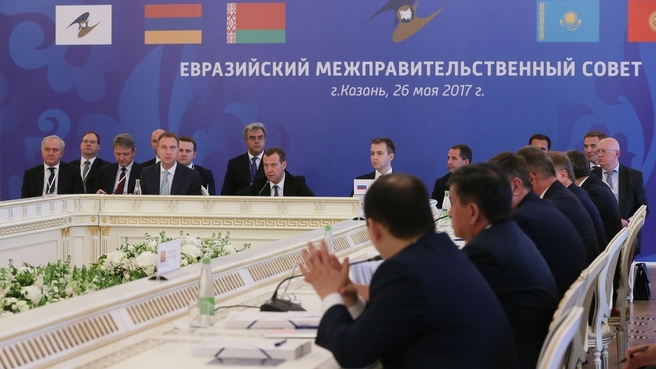The Prime Minister answered questions from Russian media.
Excerpts from the transcript:
Dmitry Medvedev: Russian Ambassador Extraordinary and Plenipotentiary to Turkey Andrei Karlov was killed in Ankara on 19 December 2016. He was shot in the presence of many people, and the photographs of his murder spread around the world within minutes.
Andrei Karlov was a career diplomat from a family of diplomats. He upheld the interests of his country faithfully and courageously, doing his best to promote ties with Turkey at a difficult period in our bilateral relations.
Today, a memorial plaque to Hero of the Russian Federation Andrei Karlov has been unveiled in the Russian Consulate General in Istanbul, in the ambassadorial gallery memorialising renowned Russian diplomats.
The murder of a diplomat whose task is to develop bilateral relations is a heinous crime. The duty of a diplomat, his service, is special, and Andrei Karlov gave his all to it. We will never forget this.
Question: What concrete results did the BSEC meeting yield?
Dmitry Medvedev: Today its members demonstrated their desire to develop economic cooperation in the Black Sea area. The members of the Organisation of the Black Sea Economic Cooperation include more than just the countries that have access to the Black Sea because the development of many border countries depends on the economic progress of the Black Sea area.
We discussed what was done in the past 25 years and how best to use BSEC instruments. We have a bank and Russia has a meaningful share in it. Dozens of projects have been funded but there could have been more. This depends on the initiative of the BSEC member states.
We have started financing project activities and allocated the first sums for such projects. We would like to hope that other countries will follow suit.
There are many transnational projects for Black Sea cooperation, for instance, the so-called Ring Road. If we carry out this project, perhaps with the participation of a number of countries outside the region, it would be useful for the entire Black Sea area.
Question: Today the Ukrainian representative had some very tough words. He said the differences between Russia and other members on the status of Crimea are actually blocking the work of BSEC. Is this really so and how will this affect Russia’s participation in the work of BSEC under the Ukrainian chairmanship?
Dmitry Medvedev: I think our Ukrainian colleague made his point, so to speak. He had instructions from the Ukrainian Foreign Ministry and read them from a piece of paper in Ukrainian. However, this has not changed our position on Crimea in any way, which is based on the will of the citizens of Crimea and the changes made to the Constitution of the Russian Federation.
As for the Ukrainian chairmanship, if the goal of it is to develop economic relations, we are open to this. Ukraine was hardest hit by the destruction of relations with the Russian Federation and other members of the Eurasian Economic Union, because these relations are significantly linked with us in one way or another.
If they want to promote cooperation in the Black Sea area, we are open to this; if they don’t want to, that’s up to them. The Ring Road project would certainly be useful for all states, including Ukraine, but such projects cannot be carried out without the consent of all states.
We will continue working under the Ukrainian chairmanship and in other periods. We believe this organisation does useful work.
Question: Today a declaration on lifting reciprocal trade restrictions was adopted with Turkey. When will the corresponding decision by the Government follow, and what commodity groups will it concern?
Dmitry Medvedev: The decision will follow immediately, according to Government regulations. My colleagues will prepare amendments to certain governmental acts and I will sign them. We have reached an agreement with Turkey: we will be taking reciprocal steps because certain restrictions existed on Turkey’s end as well.
As for commodity groups, it’s mostly fruit and vegetables, except tomatoes, as we have maintained our position in view of the investments that we have made in the industry and which, we believe, should not be wasted. This concerns restrictions on using labour and the so-called sectoral restrictions on doing business along different lines, including construction and some others. Governmental acts will be adopted along all these lines. We expect symmetrical decisions on certain items on Turkey’s part.
Question: How do you assess the security situation at Turkish resorts?
Dmitry Medvedev: The security situation at Turkish resorts depends on decisions adopted by Turkey because tourist safety is completely the responsibility of the host country and the companies involved. However, we cannot turn a blind eye to this issue. We have prepared a special document entitled “Recommendations for Our Turkish Partners” which could be used to guarantee the necessary level of safety for tourists.
Our Turkish partners received these recommendations with gratitude and are trying to follow them. We proceed from the assumption that, within the bounds of the agreements reached, Turkish authorities will do their best to provide security for the large number of Russian tourists arriving in Turkey for summer holidays.
Question: Construction of the Turkish Stream gas pipeline has begun. What are the prospects of this project? How is the process of coordinating the extension of Turkish Stream through Europe going?
Dmitry Medvedev: This is an ambitious infrastructure project, which promotes the development of our country, Turkey and the whole of Europe. Turkish Stream did not come out of nowhere: it is the realisation of previously adopted ideas and existing projects, on the one hand, and the result of the European Union’s refusal to implement the South Stream project, on the other hand. We think the decision went beyond economic considerations and primarily affected European countries themselves. But that project was shuttered, and now we are working on Turkish Stream. We began to lay the underwater part of the pipeline, which will have a length of almost 1,000 kilometres. The surface section of about 200 kilometres will be built in Turkey.
In total the pipeline will consist of two lines, with the first to completely focus on the Turkish market and the second to supply gas to European states.
Through negotiations with a number of European countries (including Greece and Bulgaria), we are determining the entry point in Europe. There are different proposals.
First of all, when making such decisions, we should analyse economic factors, as the gas pipeline is not a political but purely economic project. And after that, the capabilities of other European countries will be added in.
Ultimately, the implementation of these plans on the European continent, in EU countries, depends on decisions to be taken by European countries. We are not going to impose on anyone. We believe this is an interesting, mutually beneficial project that requires necessary decisions to be taken. Based on these factors, consultations are underway regarding which countries will participate in supplies as part of the second line of the Turkish Stream gas pipeline.


